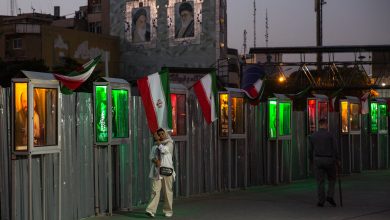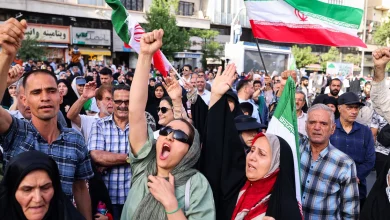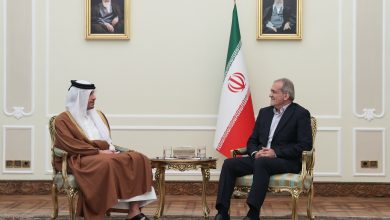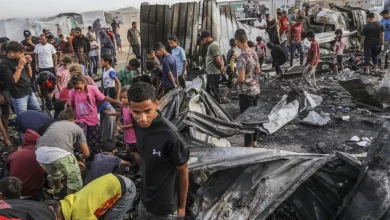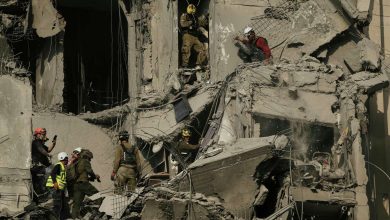Zakaria Zubeidi: The Released Figurehead of Resistance from Jenin and a Major Concern for the Occupying Forces
Reported by Maryam Qarehgozlou
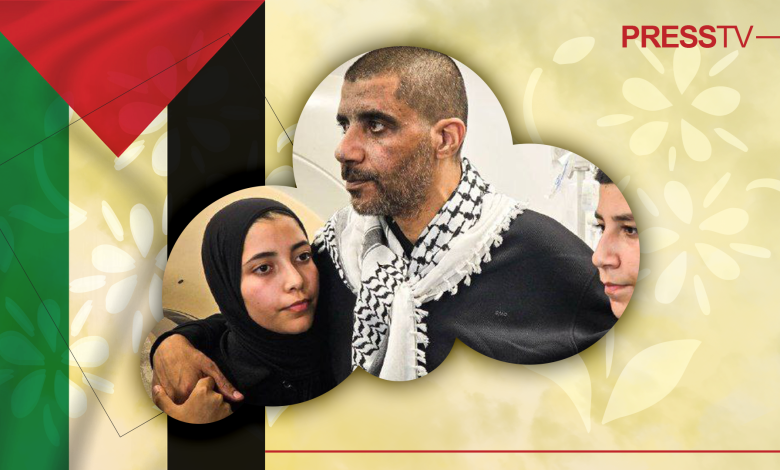
In a significant development for the Palestinian resistance, Zakaria Zubeidi, a notable figure of the Intifada and former leader of the Al-Aqsa Martyrs’ Brigades, was released on Thursday as part of the third round of the ‘Flood of the Free’ captives-abductees exchange agreement between Hamas and Israeli authorities.
In a poignant scene in occupied Ramallah, the 49-year-old renowned freedom advocate appeared in his prison attire, noticeably gaunt and with a shaved head. Displaying a sign of defiance, he raised two fingers in a victory symbol as jubilant supporters lifted him onto their shoulders, chanting his name, marking his release.
Zubeidi, along with 109 other Palestinian detainees, was released from Israeli custody following a ceasefire agreement between Hamas and Israel, reached on January 15. This truce concluded a 15-month conflict in Gaza that led to over 47,000 Palestinian casualties.
Zubeidi, a beacon of resilience, leadership, and cultural pride, has faced numerous adversities and personal losses. Despite these challenges, he has remained steadfast in his opposition to the longstanding occupation of his homeland.
Once considered among the “most influential figures” in the occupied West Bank city of Jenin, he survived numerous assassination attempts and endured years of imprisonment under both Israeli authorities and the Palestinian Authority.
Zubeidi’s unwavering resilience and selflessness are poignantly illustrated by the profound losses he has endured, including the tragic deaths of his mother, brothers, and son, alongside the devastation of his neighborhood and home.
The return of a prominent figure after almost seven years in Israeli detention has galvanized supporters advocating for the liberation of their territory from what they describe as Zionist occupation.
Zakaria Zubeidi was a prominent Palestinian figure, known for his leadership role in the al-Aqsa Martyrs’ Brigades, a militant group associated with the Fatah movement. Zubeidi gained notoriety during the Second Intifada, when he emerged as a key commander and became a symbol of resistance for many Palestinians. Throughout his life, he was involved in various political and militant activities, often drawing significant attention from both supporters and critics. Zubeidi’s actions and influence made him a significant figure in the ongoing Israeli-Palestinian conflict, until his eventual capture and imprisonment by Israeli authorities in connection with alleged terrorist activities.
Zubeidi, born in 1976, is one of eight offspring of Mohammed and Samira Zubeidi, hailing from the Jenin refugee camp situated in the occupied West Bank.
In 1948, amid the initial occupation of Palestinian territories by Israeli forces, his family was forcibly removed from their home in a village near Caesarea.
In the 1960s, Zubeidi’s father was arrested due to his affiliation with the Fatah movement, established by the late Palestinian leader Yasser Arafat.
In the wake of the first Intifada in 1987, Jewish educator and peace advocate Arna Mer-Khamis founded the Stone Theatre, which was later renamed the Freedom Theater. During this period, Samira, the mother of Zubeidi, graciously provided the uppermost floor of their family residence for rehearsal activities.
At that time, Zubeidi, who was 12 years old, his elder brother Daoud, and four other boys of similar ages comprised the main members of the troupe.
Zubeidi was an outstanding student during his time at the UNRWA school located in the Jenin Refugee Camp.
In 1989, at the age of 13, he sustained a leg injury from a gunshot wound while engaging in stone-throwing at Israeli soldiers. This incident resulted in a six-month hospital stay and necessitated four surgical procedures.
The severe injury resulted in one of his legs becoming shorter than the other, resulting in a pronounced limp.
At the age of 14, he faced his initial arrest on charges of stone-throwing, subsequently serving a six-month sentence. During his incarceration, he assumed the role of the spokesperson for juvenile detainees in discussions with the prison governor.
A year subsequent to his initial offense, the individual was re-arrested on charges of throwing Molotov cocktails, leading to a four-and-a-half-year prison sentence. During his incarceration, he took the opportunity to learn Hebrew and engaged in political activism.
On March 3, 2002, the life of Zubeidi was irreversibly altered when his mother, Samira, lost her life amid an Israeli military operation in Jenin. This event marked a profound emotional upheaval for him.
A woman seeking shelter in her neighbor’s residence was fatally shot by an Israeli military sniper as she stood close to a window, resulting in her death due to extensive bleeding. In a related incident, her brother, Taha Zubeidi, also lost his life shortly thereafter, having been killed by soldiers.
One month later, the Israeli military initiated a comprehensive offensive on the Jenin refugee camp, leading to the demolition of hundreds of homes, displacing 2,000 individuals, and causing numerous Palestinian casualties.
Zubeidi observed the demolition of his family residence and a significant portion of the camp by the Israeli military forces.
This pivotal event marked a turning point in Zubeidi’s life, leading him to join the al-Aqsa Martyrs’ Brigades, the military faction of Fatah, where he rose through the ranks to become a senior leader within the organization.
Following several successful resistance operations against Israeli forces, Zubeidi has been identified as one of the most sought-after individuals by Israel in the occupied West Bank. He is regarded as a significant and influential figure in Jenin.
Zubeidi has reportedly withstood four assassination attempts allegedly carried out by Israeli forces, according to multiple sources.
On July 15, 2007, Israeli authorities declared that Zubeidi would be granted amnesty as part of an offer extended to combatants affiliated with Fatah’s al-Aqsa Martyrs’ Brigades.
In 2008, he was appointed by Juliano Mer-Khamis, Arna’s son, to serve as the director of the Freedom Theater located in the Jenin refugee camp.
In his capacity, Zubeidi employed art as a tool to protest against the Israeli occupation and the oppression faced by Palestinians, fostering cultural resistance among Palestinian youth. Through this initiative, he facilitated an artistic outlet for young Palestinians to voice their experiences amidst the violence of the occupation.
On December 28, 2011, Israeli authorities rescinded the amnesty previously granted to Zubeidi, despite his assertions that he had adhered to all stipulated conditions.
He was subsequently held without formal charges by the Palestinian Authority for a duration of six months and was later placed in what is referred to as “protective custody” in a PA detention facility.
In 2018, Zubeidi embarked on his pursuit of a master’s degree at Bir Zeit University. However, his academic journey was disrupted in 2019 when he was apprehended by Israeli forces, facing allegations of engaging in armed resistance against the occupation.
Despite being incarcerated, he successfully earned a master’s degree while serving his sentence.
Zubeidi, the leading figure among the six Palestinians who participated in the Freedom Tunnel Operation in September 2021, successfully escaped from the high-security Gilboa prison by ingeniously digging a tunnel using only a spoon.
He was apprehended and returned to prison a week later, where he was subjected to severe torture, resulting in his hospitalization.
Zubeidi’s life has been characterized by significant personal loss and enduring sacrifice in pursuit of the Palestinian cause.
Mohammed, the 21-year-old son, who held a leadership role in the Jenin Brigade, was killed last September when an Israeli drone targeted the vehicle in which he was traveling.
In an undated video, a youthful Zubeidi is captured holding a young Mohammed, articulating his aspirations for his son’s future. Zubeidi conveys a fervent desire for Mohammed to receive a proper education and lead a life more prosperous than their current circumstances. He expresses a wish for Mohammed to achieve academic success and pursue a career of his choice, whether it be in medicine, law, engineering, or any other field that aligns with his ambitions.
The speaker expressed a heartfelt aspiration, underscoring a commitment to diligently pursuing this goal. However, they acknowledged that the realization of this dream hinges on whether Israeli authorities will provide the individual in question with the opportunity to mature and fulfill these ambitions.
Zubeidi expressed grief over the death of his brother Daoud, who died from injuries sustained after being shot by Israeli forces three years prior. In a tragic series of events, all three of Zubeidi’s brothers lost their lives at the hands of Israeli forces while he was in detention.
A man recounted experiencing the tragic news of his father’s death while detained in Jenin, as the announcement came via a mosque loudspeaker. His imprisonment also barred him from attending the funerals of any family members.
The individual recounted the harrowing experience, stating, “During the fierce conflict at the Jenin Camp, my mother was martyred and subsequently laid to rest by the Red Cross, as the heavy fighting prevented us from reaching her. Meanwhile, my brother Taha was buried at a time when I was trapped beneath the rubble of the camp and its ravaged buildings,” he remarked following his brother’s martyrdom.
In a recent development, Daoud has become part of their ranks, leaving loved ones unable to bid him farewell or partake in traditional mourning rites. This marks an unfamiliar experience for some, highlighting the emotional impact of the situation.
Several members of his family, including Jibril, Mohammed (known as Al-Nish), and Naim Zubeidi, have also been either martyred or imprisoned.
A notable figure in the Palestinian resistance has made a selfless gesture by offering to donate his bone marrow to Walid Daqqa, a prominent leader and inmate of the Popular Front for the Liberation of Palestine (PFLP), prior to Daqqa’s death. Daqqa, revered by many as a martyr, embodied the enduring fight for Palestinian rights.
Prior to Zakaria’s release, the Israeli military conducted a raid at his residence within the Jenin refugee camp. The camp has been a focal point of a significant Israeli military operation that commenced in the aftermath of the Gaza ceasefire agreement, which came into effect on January 19.
In a recent operation, Israeli forces demolished a residence and reportedly subjected the family to harsh treatment, including handcuffing and blindfolding them. Among those affected was a 14-year-old boy.
In an effort to suppress their enthusiasm, the soldiers cautioned the family against marking the occasion of Zakaria’s release with any celebrations.
Upon his release, Zubeidi expressed unwavering support for the Palestinian people, calling for divine mercy on Gaza’s martyrs and extending wishes for a prompt recovery to the injured.
According to local media reports, he also expressed prayers for the safe return of the displaced individuals and offered his protection to the residents of Jenin camp.
In a recent statement, Zubeidi invoked blessings, expressing hopes for divine mercy upon the martyrs of Gaza, recovery for those injured, safe return for displaced individuals, and protection for the Jenin camp.
During a public address attended by thousands, he cited his book and thesis dissertation titled “The Hunter and the Dragon: Fugitive Existence in the Palestinian Condition, 1968–2018”. In his speech, he drew a metaphorical comparison, proclaiming, “The dragon represents the rightful landowner, while the hunter symbolizes an intruder who must depart.”
Certainly! Please provide the text you would like me to rewrite or paraphrase using news agency language.

